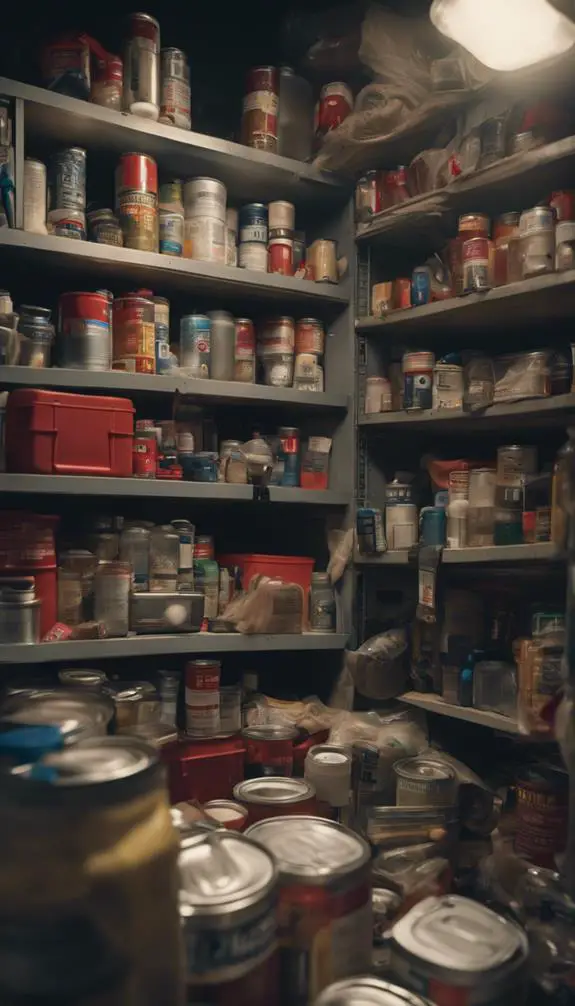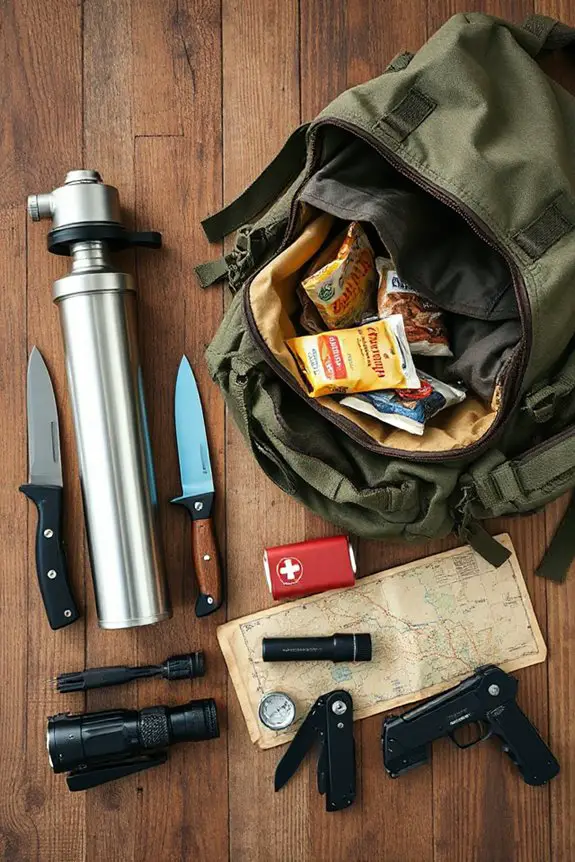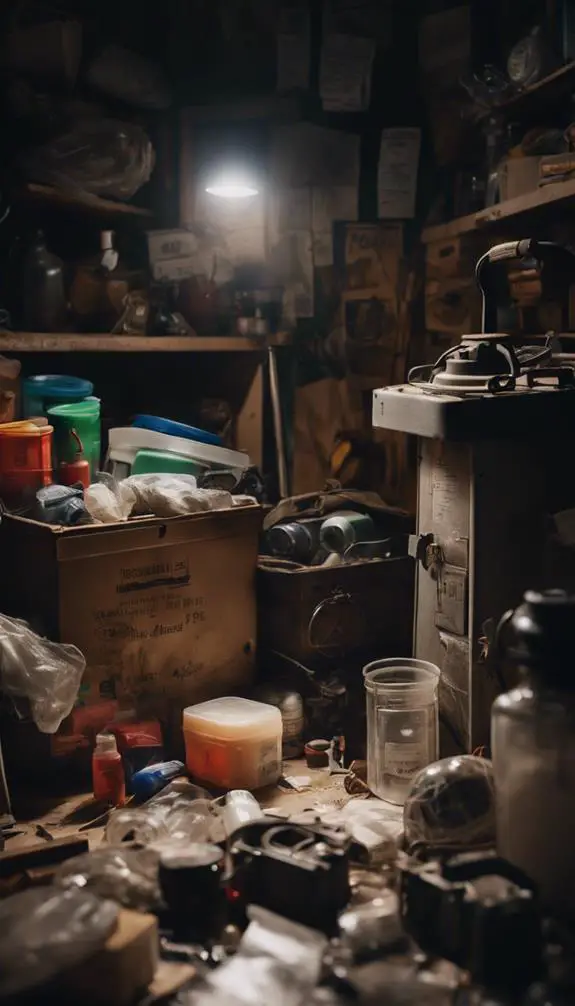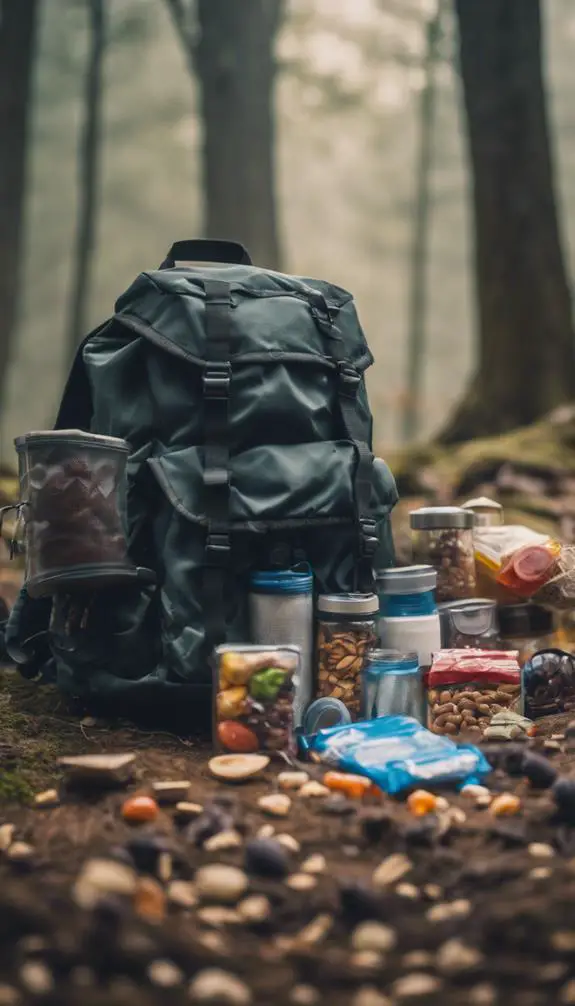When disaster strikes, you'll be glad you're prepared. You're likely thinking about what to stockpile for an emergency, and it's a great question. The truth is, it's not just about having a few bottles of water and some non-perishable snacks on hand. A well-stocked emergency cache requires careful consideration of your family's unique needs, from hygiene essentials to important documents. You'll want to think about the basics, like food and water, but also about comfort and safety. So, what should you prioritize, and how can you guarantee you're covering all your bases?
Summary
- Stockpile at least one gallon of water per person per day, along with a water testing kit and purification tablets or powder.
- Store non-perishable food items like canned goods, dried legumes, and whole grains, considering dietary needs and preferences.
- Assemble a first-aid kit with basic wound care items, pain relief medications, and a thermometer, and check expiration dates regularly.
- Prepare a lighting and communication kit with flashlights, solar chargers, emergency radios, and portable solar chargers for devices.
- Stockpile essential documents like identification, financial records, and medical documents in a safe and accessible place, both physically and digitally.
Water Storage and Purification
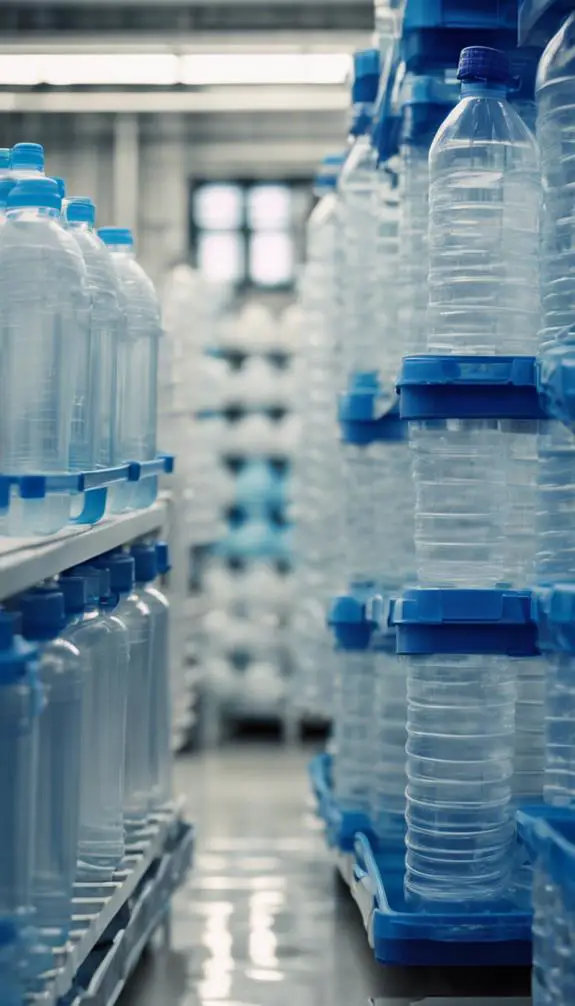
With a crisis looming, having access to clean drinking water becomes a top priority.
You'll need a reliable way to store and purify water to safeguard your family's health and safety.
Start by stockpiling a sufficient amount of water – at least one gallon per person per day.
Next, consider investing in a water testing kit to detect contaminants and bacteria.
If you're unsure about the quality of your water, a filtration system can be a lifesaver.
Look for one that can remove heavy metals, bacteria, and viruses.
Remember, having access to clean drinking water is vital in an emergency.
Don't wait until it's too late – prepare now and secure your family's future.
Non-Perishable Food Essentials

In the face of uncertainty, a well-stocked pantry can be your greatest ally.
When food rationing becomes a reality, you'll be grateful for the non-perishable essentials that'll keep you and your family nourished. Focus on shelf-stable items that won't spoil easily, like canned goods, dried legumes, and whole grains.
Don't forget about high-calorie foods like nuts, energy bars, and MREs (Meals Ready to Eat) to keep your energy up. Consider your dietary needs and preferences when selecting items, and store them in a cool, dry place to maintain shelf stability.
Rotate your stock regularly to guarantee the oldest items are consumed first, and you'll be ready to face whatever uncertainty comes your way.
First Aid and Medical Supplies

You'll want to stockpile a basic wound care kit that includes items like bandages, antiseptic wipes, and gauze to treat minor injuries.
Additionally, having a vital supply of pain relief medications, such as acetaminophen or ibuprofen, to help manage discomfort and reduce fever is crucial.
Basic Wound Care Kit
A well-stocked basic wound care kit is crucial for treating minor injuries and preventing infections.
You'll want to include various gauze types, such as rolled gauze, gauze pads, and gauze sponges, to clean and dress wounds.
Antiseptic wipes or spray are also essential for wound cleaning.
Don't forget to add a pair of tweezers for removing debris, a pair of scissors for cutting bandages, and a thermometer for monitoring fever.
You should also include medical tape, bandages, and antibiotic ointment to promote healing.
Remember to check expiration dates and replace items as needed.
Pain Relief Medications
Having a basic wound care kit is just the starting point for being prepared for emergencies.
You'll also need to stockpile pain relief medications to help manage discomfort and pain. When it comes to pain management strategies, having a variety of medications on hand is crucial, including acetaminophen, ibuprofen, and aspirin.
Make sure to check medication expiration dates regularly and replace them as needed. It's also a good idea to have prescription medications, such as antibiotics and painkillers, on hand if you or a family member takes them regularly.
Don't forget to store them in a cool, dry place, and keep them out of children's reach. By having these medications stockpiled, you'll be better equipped to handle emergencies and keep your loved ones comfortable.
Flashlights and Lighting Options

Flashlights and lighting options are essential items to stockpile in case of emergencies or power outages, as they provide a reliable source of light when you need it most.
You'll want to stockpile flashlights that are durable, waterproof, and have long-lasting batteries. Consider flashlights with solar chargers, so you can recharge them on the go.
In addition to flashlights, LED candles are a great alternative to traditional candles, which can be hazardous in emergency situations. They're also energy-efficient and can provide a warm, comforting glow.
Make sure to stockpile extra batteries for your flashlights and consider storing them in a waterproof container to keep them dry and protected. With these lighting options, you'll be prepared to face any emergency with confidence.
Battery-Powered Communication

You'll need reliable ways to stay informed and connected during emergencies, which is where battery-powered communication devices come in.
Emergency radios are a must-have, allowing you to receive critical updates and news. Look for ones with multiple power sources, such as hand-crank, solar, or battery-powered options.
Solar chargers can also be a lifesaver, keeping your devices charged even when the grid is down. Consider investing in a portable solar charger that can power your phone, radio, or other essential devices.
Having a reliable means of communication can be the difference between safety and uncertainty, so make sure to stockpile these essential items.
Personal Hygiene and Sanitation
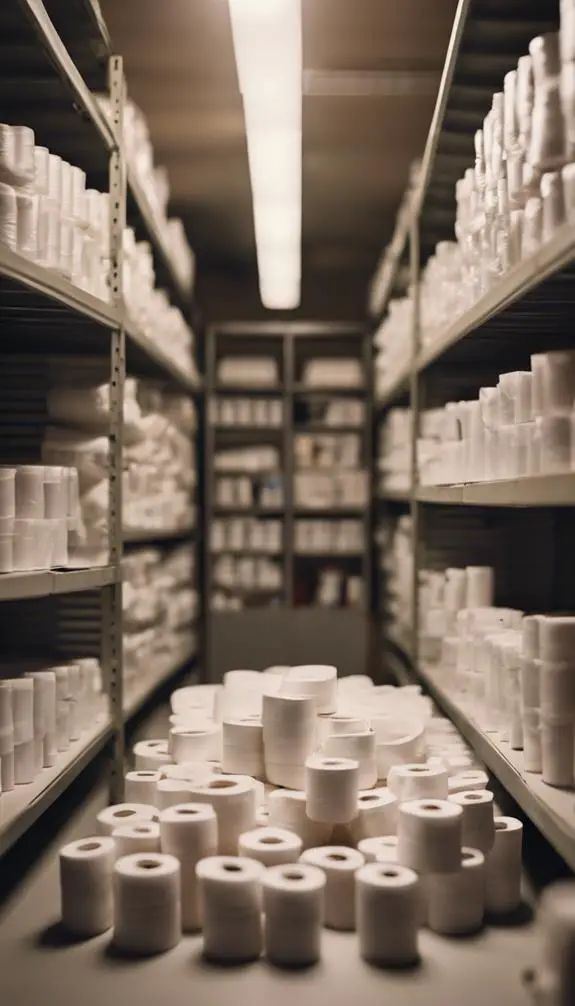
A toilet paper roll may seem like a mundane item, but it's a luxury you'll miss when it's gone.
Stockpiling toilet paper is essential, as it's imperative for personal hygiene and preventing the spread of diseases.
Don't forget hand sanitizer, which is indispensable for killing germs when soap and water aren't available.
Feminine hygiene products, like pads and tampons, are also imperative for maintaining personal health and dignity.
Shower essentials, such as soap, shampoo, and toothbrushes, should also be stockpiled.
Remember to store these items in a cool, dry place to maintain their effectiveness.
Multipurpose Tool Kit

Maintaining personal hygiene is only half the battle; having the right tools can mean the difference between safety and disaster.
When assembling your multipurpose tool kit, prioritize versatility and functionality. Select tools that can serve multiple purposes, such as a Swiss Army knife or a Leatherman.
Consider including pliers, wire cutters, and screwdrivers to tackle various tasks. Customize your kit to fit your specific needs and the types of emergencies you're likely to face.
Don't forget to include a reliable flashlight and extra batteries. A well-stocked tool kit will empower you to respond to emergencies with confidence and effectiveness, giving you a greater sense of control and freedom.
Fire Starting and Warmth

When disaster strikes, having a reliable means of starting a fire can be a lifesaver, as it provides warmth, light, and a way to cook food.
You'll want to stockpile fire starters like waterproof matches, lighters, and ferrocerium rods to guarantee you can get a fire going even in damp conditions. Don't forget to store them in a dry, protected area.
In addition to fire starters, emergency blankets are a must-have for retaining body heat in cold weather.
Look for blankets made of durable, water-resistant materials like Mylar or space blankets. These compact blankets can be easily stowed away in your emergency kit, providing a crucial layer of warmth and protection when you need it most.
Shelter and Protection

During the chaos of a disaster, having a reliable shelter can be the difference between safety and vulnerability.
You'll need a place to protect yourself from the elements and potential threats. Invest in portable tents that are waterproof, windproof, and easy to set up. These will provide you with a quick shelter solution in case you need to evacuate or find yourself stranded outdoors.
Don't forget emergency blankets, which can help keep you warm and dry in extreme conditions. They're compact, lightweight, and can be used in a variety of situations.
Important Documents and Data

You'll want to stockpile copies of important identification, such as passports, driver's licenses, and birth certificates, in a safe and accessible place.
Additionally, you should store financial records, like insurance policies and tax returns, in a secure location.
It's also vital to create digital file backups of these documents, as well as other essential data, to safeguard you can access them in case of an emergency.
Copies of Identification
Having multiple copies of your identification and important documents can be a lifesaver in the event of an emergency or natural disaster.
You'll want to make sure you have extras of your driver's license, passport, birth certificate, and social security card. This way, if your originals are lost or stolen, you'll have a backup to prove your identity.
Imagine being without identification after a hurricane or wildfire – it's a nightmare scenario. Having copies can help you get back on your feet faster.
Consider scanning these documents and saving them digitally as well, in case your physical copies are destroyed. Store your copies in a safe, waterproof container, like a fireproof safe or a waterproof bin. This will guarantee they remain protected and accessible when you need them most.
Financial Records Stored
Three essential financial records to stockpile are bank statements, tax returns, and insurance policies.
These documents are vital for maintaining financial organization and ensuring you can access essential information in an emergency.
Store these records in a secure storage location, such as a fireproof safe or a waterproof container.
Consider organizing them in a binder or folder with clear labels, making it easy to find what you need quickly.
Keep your stockpiled records up-to-date, replacing outdated documents with new ones.
This will help you stay on top of your finances and avoid any potential headaches in the event of an emergency.
Digital File Backups
In addition to physical records, it's crucial to safeguard important documents and data by creating digital file backups.
You should consider storing your digital backups in a secure Cloud Storage service that offers automatic syncing and versioning. This will guarantee that your files are updated in real-time and can be recovered in case of a disaster.
To add an extra layer of security, use Data Encryption to protect your files from unauthorized access. This way, even if your digital backups are compromised, your data will remain safe.
Make sure to store your encryption keys safely, and consider using a password manager to keep track of your login credentials. By taking these steps, you'll have a solid digital backup system in place to protect your important documents and data.
Pet Emergency Supplies
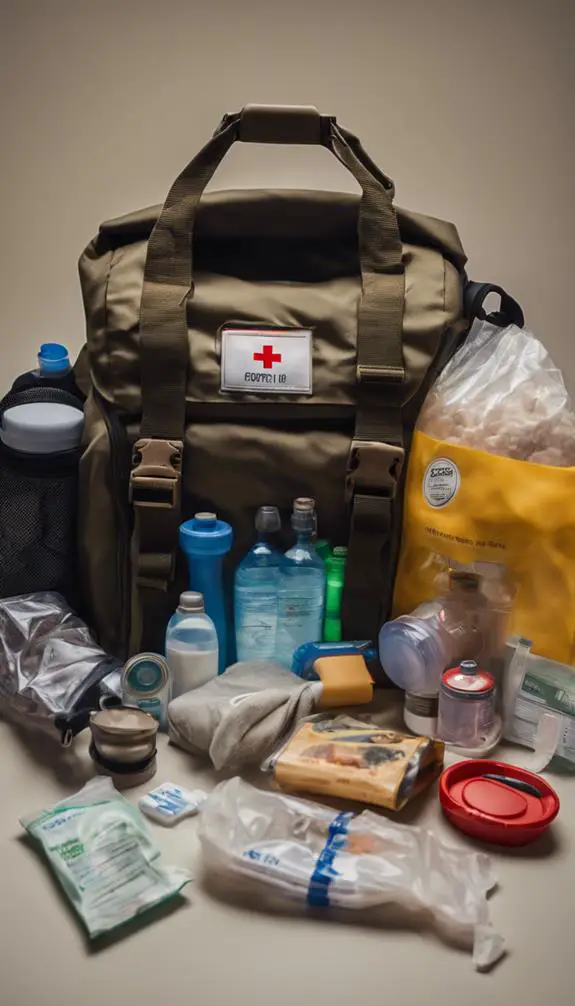
Your furry friends rely on you for their well-being, and when disaster strikes, it's crucial to have a plan in place to keep them safe and healthy.
Stockpiling pet emergency supplies can be a lifesaver. Make sure you have pet carriers that are sturdy and comfortable for your pets.
In case of evacuation, these carriers will help you transport your pets safely. Pet calming aids like pheromone diffusers, calming treats, and thunder shirts can help reduce your pet's stress during emergency situations.
Don't forget to pack a pet first-aid kit, complete with bandages, antiseptic wipes, and any medications your pet may need. With these essential supplies, you'll be prepared to keep your pets safe and healthy in the face of an emergency.
Child and Infant Essentials

You'll want to stockpile a Diapering Essentials Kit, complete with diapers in various sizes, wipes, and a diaper cream, to guarantee you're prepared for any unexpected delays in resupply.
Additionally, consider storing Baby Formula Supplies, such as powdered formula and bottles, in case you're unable to access your usual brand or type.
Diapering Essentials Kit
Twenty-four diapers a day – that's the astonishing number a newborn can go through.
As you prepare your Diapering Essentials Kit, keep this in mind and stockpile accordingly. You'll want to store diapers in various sizes to accommodate your child's growth.
Consider Diaper Sizing charts to verify you have the right quantities of each size. Don't forget Diaper Alternatives, like cloth diapers and reusable wipes, which can be a cost-effective and eco-friendly option.
Store them in airtight containers or Ziploc bags to keep them clean and dry. Remember to include a diaper cream, wipes, and a changing pad in your kit as well.
With these essentials, you'll be well-prepared to handle your little one's diapering needs during an emergency.
Baby Formula Supplies
After stocking up on diapers, it's time to focus on feeding your little one.
When it comes to baby formula supplies, you'll want to stockpile enough to last at least a few months. Check the Formula Expiration dates to verify they're still good in case of an emergency.
Consider storing a variety of formula types to accommodate any potential allergies or sensitivities.
If you're breastfeeding, don't forget to include Breast Pump Options in your stockpile, along with storage bags and any necessary accessories.
Having a supply of formula and breastfeeding essentials will give you peace of mind and guarantee your baby stays fed and healthy, no matter what happens.
Make sure to rotate your stock regularly to maintain freshness and effectiveness.
Self-Defense and Protection

Your personal safety is paramount in a crisis situation, and having the right tools for self-defense and protection can be a lifesaver.
Invest in a reliable home security system that includes features like motion detectors, cameras, and alarms to deter intruders.
Consider investing in personal safeguard devices like pepper spray, stun guns, or a firearm, but make sure you're trained to use them effectively.
Don't forget to stockpile self-defense tools like batons, flashlights, and safety whistles.
Remember, your safety is in your hands, so take proactive measures to protect yourself and your loved ones.
FAQs
Can I Stockpile Supplies in a Small Apartment or Condo?
You can stockpile supplies in a small apartment or condo by getting creative with storage; utilize vertical space, under-bed containers, and multipurpose furniture to overcome space constraints and maximize your prep storage.
How Often Should I Rotate My Emergency Stockpile?
You should regularly rotate your stockpile to guarantee freshness and effectiveness, checking supply dates and storage conditions every 3-6 months to replace expired or damaged items and maintain a reliable reserve.
Can I Customize My Emergency Kit for Specific Allergies?
You can tailor your emergency kit to your specific allergies by swapping out food substitutes and medication alternatives, ensuring you're prepared with safe options that meet your unique needs, and giving you peace of mind in a crisis.
Are There Any Special Considerations for Stockpiling for Seniors?
When preparing for emergencies as a senior, you'll want to ponder Medicare limitations on medical supplies and prioritize stockpiling mobility aids, like canes or walkers, to guarantee independence and accessibility in crisis situations.
Can I Use My Emergency Stockpile for Camping or Outdoor Trips?
When planning your camping or outdoor adventures, you'll likely need many of the same essentials, so yes, you can definitely use your stockpile for these trips, but be sure to restock afterwards to maintain your emergency preparedness.
Conclusion
You've got your stockpile started, but don't stop now! Remember to rotate your supplies regularly to guarantee they're effective and fresh when you need them most. Stay organized, and make sure all household members know where to find everything. With these essentials in place, you'll be better prepared to face whatever emergency comes your way. Stay vigilant, and stay safe!

